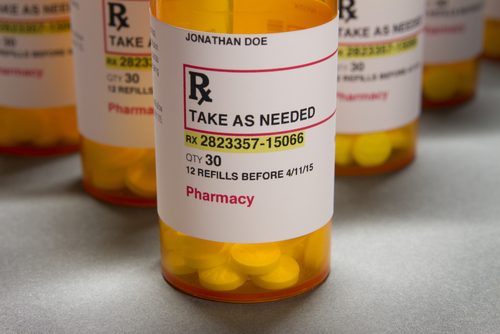
Opioid prescriptions, such as morphine, hydrocodone, and oxycodone have quadrupled in the past 23 years, going from 76 million in 1991 to nearly 300 million in 2014. As prescription drug use becomes more and more ubiquitous, it’s no surprise that it is now impacting our roadways. A 2016 National Survey on Drug Use and Health (NSDUH) showed that 11.8 million people, aged 16 or older, drove under the influence of illicit drugs.
PRESCRIPTION DRUG USE & AUTO ACCIDENTS
A 2010 study of deadly auto accidents showed that of those U.S. drivers who tested positive for drug use, 47% involved prescription drugs. That percentage is higher than the amount using marijuana or cocaine.
How Prescription Drugs Impact Driving
Regardless of whether a person has a legitimate prescription for drug use or obtained them illegally, operating a vehicle under the influence of many prescription medications is illegal in Georgia. This is because the drugs are intended to alter the body’s chemical makeup to solve a medical issue – oftentimes leading to side effects that make operating a vehicle dangerous. Different drugs can impact driving in various ways:
- Central Nervous System Depressants, such as opioids, can cause drowsiness, inability to concentrate, slower reaction time, distractibility, and mental clouding.
- Central Nervous System Stimulants, such as amphetamines, can cause poor impulse control, agitation, tunnel vision, irritability, and aggressiveness.
- Sedatives, such as benzodiazepines, can cause decreased alertness, dizziness, lack of coordination, and decreased concentration.
Prescription Drugs And Trucking Accidents
In 2007, the Federal Motor Carrier Safety Administration reviewed the causes of crashes involving commercial motor vehicles, like eighteen-wheelers. It was the first study of its kind to look at all pre-crash factors nation-wide.
The top ten reasons for crashes might not surprise you, but the order might. Many people assume that fatigue would be the number one reason for crashes, but the top reason for trucking accidents is actually prescription drug use.
Here’s the breakdown:
• Prescription drug use topped the list, causing 26% of big rig crashes.
• Traveling too fast for road conditions was the number two reason, causing 23% of crashes.
• Being unfamiliar with the roadway came in at number three, with 22%.
• Over-the-counter drug use was the fourth most common cause of trucking crashes with 18%.
• Surprisingly fatigue doesn’t even make the top five, as inadequate surveillance takes the fifth spot with 14%.
• At number six, fatigue causes 14% of crashes involving commercial vehicles.
• Illegal maneuvers cause 9% of commercial vehicle crashes.
• Not paying attention caused 8% of crashes by trucks.
• Being distracted by something outside of the vehicle caused 8% of the crashes
• Trucks require a lot of maneuvering; underestimating the action needed to avoid a crash took the tenth spot, causing 7% of accidents.
Ask Your Doctor & Check The Label
If you’ve been prescribed medication and were instructed, by the doctor or by the label on the bottle, not to operate a vehicle for any reason, it is important not to drive. Even over-the-counter drugs can cause side effects that make driving dangerous, so before consuming any type of medication make sure it doesn’t come with a warning. And if it does, heed the warning – because you can be held liable for damages and injuries to those in an accident you caused. Even an honest mistake can ruin your life and the lives of others.
If You’ve Been In An Accident Involving Prescription Drugs
If you’ve been in an accident that involved prescription drugs, contact the qualified Marietta personal injury attorneys at Jones & Swanson today.
Categories: Drunk Driving, Personal Injury, Truck Accident, Trucking Accidents, Wrongful Death




